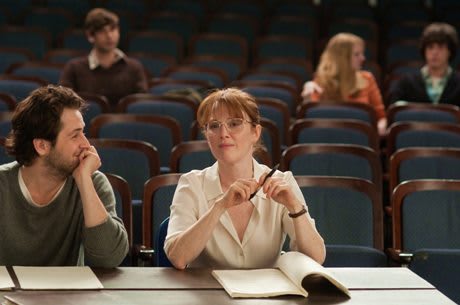When The English Teacher opens, a voiceover quickly summarizes the spinster-y disposition of high school English teacher Linda Sinclair (Julianne Moore). Uttered with false confidence, her dating and professional lives are dissected with sarcastic visual juxtapositions, suggesting that her projected reality is very different from her quotidian existence. On-screen grades and glib critiques, such as those you would find written on a graded essay, denote the central character flaw that's led to her sustainable, but lonely life: a tendency to harshly judge those around her.
This playful, but generic and ultimately flat bit of narrative flourish quickly leads into the central plot gimmick, with ex-student Jason Sherwood (Michael Angorano), a talented student that Linda taught, showing up in town, claiming to be a failed playwright. Linda, certain that her initial touting of his innate abilities was bang-on, chastises his father (Greg Kinnear) for supposedly convincing his son to give up his dream and attend law school, and convinces the flamboyant high school drama teacher, Carl Kapinas (Nathan Lane), to direct Jason's play with a cast of students.
As directed by Craig Zisk, this comedy about moral superiority plays like an extended pilot for a Showtime series. Even without looking at his resume to confirm involvement, there's a distinct Big C feeling about it all that makes it simultaneously accessible (broad) and contrived (patronizing). As Linda's world slowly implodes, with her eventually giving into carnal temptations with her ex-student and meddling in his flirtations with Halle (Lily Collins), the lead actress in his Kafkaesque play, the manic pratfalls and predictable nature make it feel more like an extended trailer than a movie unto itself.
Still, it's clear that Moore gets this character in a way the script never considered. She blends sanctimony with faux-consideration, reluctantly admitting that her false praise of a very derivative-sounding play was as morally problematic as assuming that Jason's father was unsupportive. Her character, living in a self-contained delusion of literature and ideals, is tasked with becoming more realistic in her expectations of others and more open-minded, which isn't a particularly easy journey.
And while Zisk's film never transcends the tropes of a mainstream comedy, neither visually nor thematically, Moore does manage to sell a relatively complex trajectory of character revelation, despite being forced into unlikely, highly dramatized (for presumed comedic effect) scenarios that denigrate any illusion of an organic journey.
As presented, this mostly forgettable little yarn isn't a work of any real relevance, but it does entertain and moderately satisfy inoffensively for its duration, which is better than most comedies of late.
(Pacific Northwest Pictures)This playful, but generic and ultimately flat bit of narrative flourish quickly leads into the central plot gimmick, with ex-student Jason Sherwood (Michael Angorano), a talented student that Linda taught, showing up in town, claiming to be a failed playwright. Linda, certain that her initial touting of his innate abilities was bang-on, chastises his father (Greg Kinnear) for supposedly convincing his son to give up his dream and attend law school, and convinces the flamboyant high school drama teacher, Carl Kapinas (Nathan Lane), to direct Jason's play with a cast of students.
As directed by Craig Zisk, this comedy about moral superiority plays like an extended pilot for a Showtime series. Even without looking at his resume to confirm involvement, there's a distinct Big C feeling about it all that makes it simultaneously accessible (broad) and contrived (patronizing). As Linda's world slowly implodes, with her eventually giving into carnal temptations with her ex-student and meddling in his flirtations with Halle (Lily Collins), the lead actress in his Kafkaesque play, the manic pratfalls and predictable nature make it feel more like an extended trailer than a movie unto itself.
Still, it's clear that Moore gets this character in a way the script never considered. She blends sanctimony with faux-consideration, reluctantly admitting that her false praise of a very derivative-sounding play was as morally problematic as assuming that Jason's father was unsupportive. Her character, living in a self-contained delusion of literature and ideals, is tasked with becoming more realistic in her expectations of others and more open-minded, which isn't a particularly easy journey.
And while Zisk's film never transcends the tropes of a mainstream comedy, neither visually nor thematically, Moore does manage to sell a relatively complex trajectory of character revelation, despite being forced into unlikely, highly dramatized (for presumed comedic effect) scenarios that denigrate any illusion of an organic journey.
As presented, this mostly forgettable little yarn isn't a work of any real relevance, but it does entertain and moderately satisfy inoffensively for its duration, which is better than most comedies of late.




